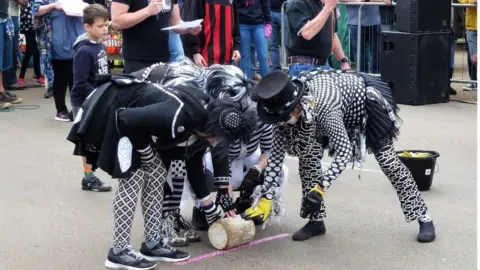Cheese rolling returns to Stilton after seven years
 Richard Humphrey/Geograph
Richard Humphrey/GeographA Cambridgeshire village preparing for the return of a "quirky" food tradition that began in the 1950s but ended partly for being "uncool".
The Stilton Cheese Rolling Festival will take place on 26 May - for the first time since 2017.
The event also ended due to rising staging costs, but a new location is making it less expensive to put on.
Organisers said the last event drew up to 3,000 visitors from all over the country.
Adam Leon, 50, one of the organisers, said: "I have been in Stilton for over 40 years; it was always a massive event - people really missed it; we thought it was time to bring it back.
"It is a free festival and when it was held in the village centre costs were rising - things like insurances, risk assessments and sorting road closures were all getting a hassle.
"The new festival site is the pavilion, which is more on the outskirts, so won't require road closures like the previous one did."
'Quirky tradition'
Mr Leon said the tradition was started by four publicans who were thinking of ways of generating income after the village was bypassed by the A1 in 1959.
"One of them came up with bringing back a quirky traditional English sport and because of our village name, cheese rolling seemed the obvious choice," he said.
"There will be a host of team races, including an F1 cheese rolling race complete with obstacles and chicanes.
"Competitors really get in the spirit of things, they dress up and make it a spectacular event."
 Richard Humphrey/Geograph
Richard Humphrey/GeographAs first reported by the Peterborough Telegraph, the revived races see teams of four people rolling a "cheese" down a course, with each member having to roll it at least once.
Real cheese is not used - instead 12in (30cm) sections of an old telegraph pole are painted to look like a cheese and propelled.
Competitors are advised to wear gloves to avoid getting splinters.
There will also be fairground rides, craft stalls and live music.
There has been an ongoing row for years about the origins of Stilton cheese and who can make it - with some historians claiming it originated in the village that bears its name in the 18th Century.
However, it can currently only be produced in Leicestershire, Derbyshire and Nottinghamshire following a ruling made under EU law which gave the cheese protected designation of origin (PDO) status for those three counties.

Follow East of England news on Facebook, Instagram and X. Got a story? Email [email protected] or WhatsApp 0800 169 1830
